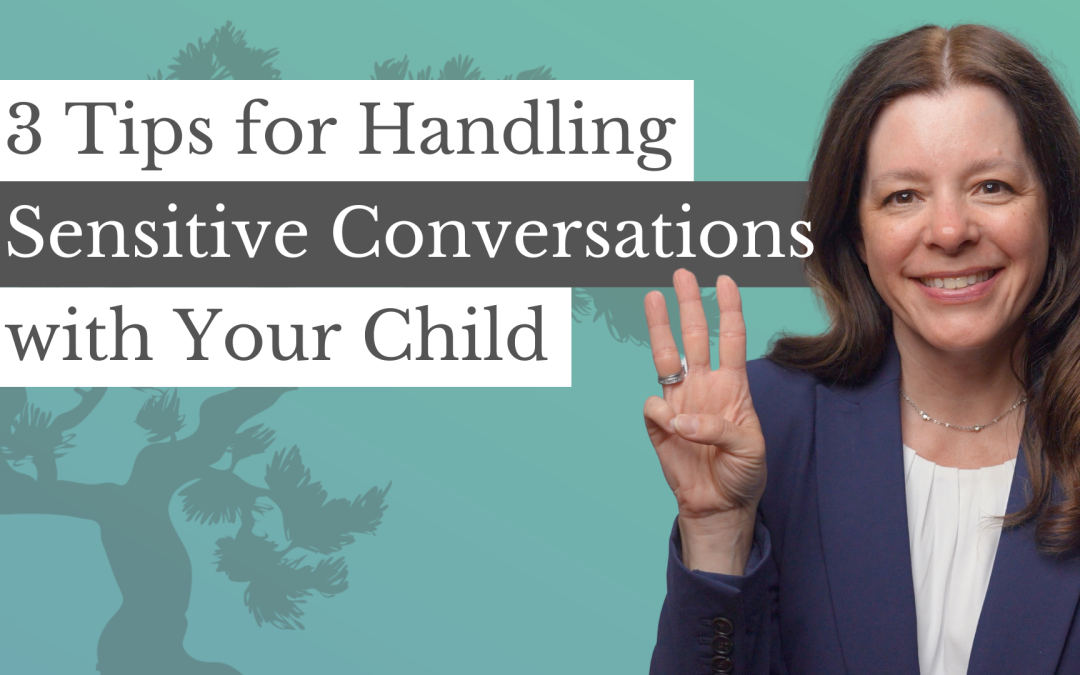As a parent, there will inevitably be times you need to have tough conversations with your child. Whether it’s about bullying, puberty, substance abuse, or something else entirely, these discussions can feel overwhelming for both you and your child.
The good news is, with some preparation and the right approach, you can create a safe space for open communication and equip your child with the knowledge and support they need.
Hi, I’m Camille Hoffman, a Licensed Social Worker at Cedar Tree Counseling, and in this video I’ll share some tips for handling sensitive conversations with your child.
1. Pick the Right Time and Place
Avoid starting difficult conversations right before bedtime, after a fight, or when they’re rushing out the door for soccer practice. Look for a relaxed moment when they’re not already stressed or overwhelmed.
Then, find a quiet, private space. This could be their bedroom with the door closed, a comfy spot on the couch, or even a walk in nature if that feels comfortable for both of you. The key is to be free from distractions and interruptions.
And, start with small talk. Ease into the conversation with some lighthearted chit-chat about their day or something they’re interested in. This helps break the ice and shows you’re interested in them as a person, not just the topic at hand.
2. Validate Their Feelings
Explain that their emotions are a normal response to the situation. For example, you could say something like, “It’s completely understandable to feel angry after being excluded from the game.“
Let them know it’s okay to feel happy, sad, angry, scared, or any combination of these. You can say, “It’s important to express your feelings, even the negative ones.“
Also, try to see things from their perspective and acknowledge their struggle. You could say, “I can see why you’re feeling hurt. Being left out can be tough.“
And, share a relatable experience from your own childhood (if appropriate) to show you understand. This can help them feel less alone.
3. Focus on Solutions Together
Ask open-ended questions like, “What ideas do you have for dealing with this situation?” or “How do you think we can move forward?” This encourages them to think critically and develop solutions.
Guide the conversation towards healthy coping mechanisms and proactive approaches. For example, if they’re being bullied, brainstorm ways to assert themselves confidently or involve a trusted adult.
But, if they’re not ready to brainstorm solutions yet, don’t push it. Sometimes, just listening and validating their feelings is enough for the moment. You can revisit problem-solving later when they’ve had time to process their emotions.
Also, leave the door open for further discussion. Let your child know you’re always available to talk more if they need to. Phrases like, “This is an ongoing conversation, and I’m here for you whenever you’re ready to talk” can be helpful.
Change takes time, and these conversations may need to be repeated. Consistency in your approach and emotional support will help them feel secure and supported.
Bonus Tip: Know When to Seek Professional Help
If the topic feels overwhelming for you or your child, or the situation seems beyond your ability to manage, don’t hesitate to seek professional help from a therapist or counselor.
Remember, communication is key. Open and honest communication is the foundation of a strong parent-child relationship. By creating a safe space for these difficult conversations, you’re equipping your child with the tools they need to navigate life’s challenges.
If you’re struggling to have a difficult conversation with your child, or if you’re concerned about their mental health, we can help. Our experienced therapists can provide support and guidance for both you and your child. Contact us today to schedule an appointment.

Camille Hoffman
Children, Teens, and Adults
I believe no one, child or adult, should have to navigate mental health challenges alone. I can relate to your struggle and I’m committed to supporting you every step of the way.
Choose A Topic!
Cedar Tree's Mission:
There are a lot of broken families who struggle to do life well together.
That’s why we help families create an environment where deeper connection & healing can happen.
GENEVA OFFICE
2172 Blackberry Drive, Suite 202
Geneva, IL 60134
(630) 797-9872
*By Appointment Only*
HINSDALE OFFICE
15 Spinning Wheel, Suite 125
Hinsdale, IL 60521
(630) 797-9872
*By Appointment Only*


